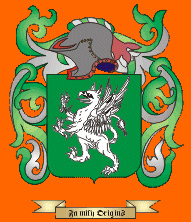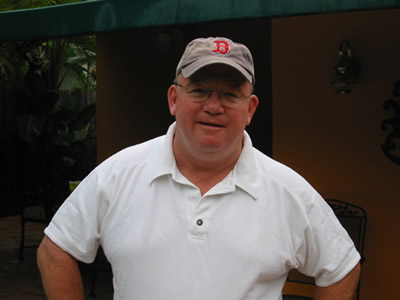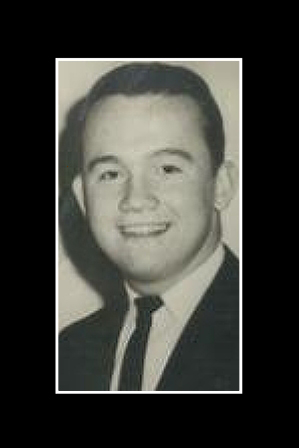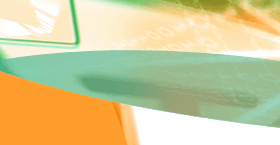|
DORGAN FAMILY

THE ORIGINS OF THE DORGAN SURNAME
Ó DEARGÁIN
The DORGAN
surname is derived from the Irish surname Ó Deargáin. The Irish name
literally means the "the grandson of the little red man". The Ó prefix
means "descended from", or "of" (i.e. "grandson"). The feminine form of
the surname is Ní Dheargáin.
The "i" in Deargáin means 'of'. Our ancestor's name was
Deargán. His grandson described himself as Ó Deargáin ('grandson
of Deargán') and so established the surname. Irish does things
like letting you stick 'of' inside a name like this because, basically,
it's a far more developed language than English. You don't need a
separate word to do it.
Here is the best explanation that I have seen about the DARGAN / DORGAN
name courtesy of my Internet friend, Jerry Kelly, one of the best
sources of "things Irish". "Re-printed here by permission of the author. All Rights Reserved By Author Under Copyright ©."
"MacLysaght (Surnames of Ireland)
writes "(O) Dargan - The Leinster form of Ó Deargáin (dearg,
red). In Co. Cork it takes the form Dorgan and is perpetuated in
the place-name Ballydorgan." Let's note that MacLysaght chooses
to place your name under (O) Dargan because he knows that's how the
name should be pronounced.
de Breffny (Irish Family Names)
writes "Dorgan - This name found principally in Co. Cork, derives from
the Irish Ó Deargáin. The name of Ballydorgan townland in the
barony of Condons and Clangibbon indicates an early home of the
family. The variant form Dargan is found in
Leinster." We should add that properly speaking, Dargan
isn't the variant. Dorgan is the variant.
Woulfe (Sloinnte Gaeidheal 7 Gall / Surnames Of The Gaeil & The Gaill)
writes "Ó Deargáin (Dargan, Dergan, Dorgan, Dorrigan); descendant of
Deargán (diminuitive of dearg, red); an old surname in Westmeath,
Offaly and Cork. In the last-named county, it is now anglicized
Dorgan, which is not very correct."
So Woulfe points out that Dorgan is a poor pronunciation of the original Ó Deargáin, and he's right.
So there's apparently no doubt that your original surname is actually Ó Deargáin.
And here we see the moment that your family made the move from speaking Irish to also speaking English:
"BUT ... my GGGrandfather was Patrick DARGAN, at least in Griffith's
Valuation of County Cork in the 1850s and on the marriage certificate
(November 1886) of his son PATRICK J. DORGAN."
Meanwhile, Woulfe, and only Woulfe, cites the existence of the name Ó
Dorcháin in Irish, but can't come up with a suitable explanation for
its existence.
Woulfe writes "Ó Dorcháin - Dorgan, Dorrigan, (?) Doorigan; 'descendant
of Dorchán' (diminuitive of Dorchaidhe); a rare surname in Cork and
Kerry, probably the same as Ó Dorchaidhe." Well, this isn't
exactly right. The diminimuitive of Dorcha, meaning 'dark', would
be Dorchán, and I can't find either Dorcha nor Dorchán in the old
manuscript sources as an actual Irish name. The diminuitive of
Dorchaidhe would actually be something like Dorchaidheán, and I can't
find that either, although it could conceivably exist.
Further, Ó Dorchaidhe ('grandson of dark-man' from the root dorcha
meaning 'dark') has been anglicized as Dorkey, Darkey, and even Dorcey,
Darcy, and D'Arcy, but nobody has ever actually found an example of the
name being anglicized to Dorgan. And notice that Woulfe has
not tried to connect the name to some actual or ancient family of the
name Ó Dorcháin. He knows no such family existed.
Instead, he concludes that Ó Dorcháin / Dorgan must be a very wide
variation in spelling and pronunciation from some other actual Irish
name. And he's right. But he chooses the wrong family, he
chooses Ó Dorchaidhe.
Why? Because Ó Dorchaidhe is the only actual Irish family name
which uses dorcha ('dark') as its root. And dorcha would have to
be the root of a surname spelled Ó Dorcháin. Unfortunately for
his theory, however, the 2 distinct, unrelated families which share the
name Ó Dorchaidhe are 1) a branch of the Uí Fhiachrach way up around
Lough Mask in Mayo; and 2) a branch of the Uí Mhaine in Galway.
No Kerry or Cork in sight. So Woulfe was right about Ó Dorcháin
being a wide variant of some other name. But he was very wrong
about which one.
So what did actually happen? How did the name Ó Dorcháin come into existence, at least in Woulfe's work?
Well, here's one guess. Woulfe was writing at the beginning of
the 20th century. By then, as your own family history attests,
east Cork had gone mostly English-speaking. But in west Cork and Kerry
Irish was still widely-spoken, even more so than today. So, maybe
what happened is that the poorly anglicized form of your name (i.e,
Dorgan) found its way back into Irish further west in the
Irish-speaking areas of Cork and Kerry. And because it was so
badly pronounced, so different from the original Ó Deargáin, the
Irish-speakers of those areas assumed it was a totally different name
and Gaelicized it phonetically as best they could. Therefore, as
Woulfe points out, Ó Dorcháin was rare indeed. In fact, from a
genealogical perspective, it was actually non-existent.
So, that's the best explanation I can come up with for the existence,
at least in Woulfe's work, of the name Ó Dorcháin. Either way,
whether I'm right or wrong about how the name Ó Dorcháin came to exist,
you're actually an Ó Deargáin, not an Ó Dorcháin nor an Ó
Dorchaidhe.
As for the annals, I only have the Annals Of Connacht, Ulster, and
Inishfallen here - no sign of Ó Deargáin. But these are western
and northern sources. The family exists, the surname Ó Deargáin
is real, like other Irish Gaelic surnames yours has been in use for the
last thousand years or so, so we should have every reason to expect
that your people are out there documented in Irish somewhere."
Here is an extraordinary commentary
about the ancient DORGAN family,
by Jerry Kelly:
Dear Bill,
I've found out something about your family which I think is truly
amazing and a testament to your ancestors' absolute determination and
persistence over the last 2,000 years.
As Celtic population groups and Celtic culture came to Ireland, the
earlier bronze age population groups became Celts as well. (The
Celts are a cultural and linguistic group, not a race, which is why we
have so many different varieties of Irish - freckled red heads, tall
blonds, swarthy west Corkmen, huge Black Irish, etc.)
Similarly, up until the 8th century or so, when a large and powerful
tribe conquered a territory, the older population groups were sometimes
given false genealogies which made them part of the incoming
tribe. So when the Laighin conquered the area now called Leinster
(Laighin-ster), they gave Laighin genealogies to some of the Cruithin
('Pict') and Érainn tribes who were already there. T.F. O'Rahilly
in Early Irish History And Mythology concluded that 2 of the 4 main
divisions of the Laighin are actually pre-Laighin tribes of Érainn
descent.
Some, however, were not absorbed in this fashion. These Cruithin
and Érainn hold-outs, all Celts by the time of the Laighin conquest
(3rd-1st centuries B.C.?), are called forshloinnte ('external
families', meaning external to the tribe) in our Seanchas tradition
(the Gaelic learned tradition which indivisibly combines law, history,
and genealogy).
Things were not easy for the forshloinnte. All were pushed off
the best land. They were taxed. Some were forced into exile. They
suffered the worst in every war and famine. Gradually over time,
their numbers decreased greatly. I, personally, have never before
met a bona fide descendant of a forshloinne and I've been doing this
kind of research for over 30 years. Writing in 1650 at the height
of the Cromwellian genocide, the great genealogist Dubhaltach Mac
Fhirbhisigh reflected on how few of the Irish had survived ("...ar a
laghad mhaires díbh aniu..."), especially amongst the forshloinnte.
But a very few insisted on holding on, holding out, and even
flourishing anyway. In honor of your ancestors, I note the
following entries in our Seanchas about your family and your tribe:
Forsluinti iomorro Húa Lugdach meic Thuathail Tigich: Húi Dile
deogbaire dia tát Húi Derggáin, Húi Gumáin, Húi Síláin Chrecóra.
(the manuscript called Rawlinson B.502, 12th century, 125a35)
Forshloinnte Ua Lugdhach, .i., Uí Didli deogbair, dia ttáid Uí
Dheargáin, Uí Gomain, agus Uí Shíoláin Crecora. (The Book Of
Genealogies by Dubhaltach Mac Fhirbhisigh, 1650, 461.5)
Translation: External families in the territory of the Uí
Lughdhach Mhic Thuathail Thighich - the Uí Dhile Dheogbhaire (the
descendants of Dil the cupbearer), from whom are the Uí Dheargáin, Uí
Gomain, and the Uí Shíoláin of Crecóra
Here we see that not only did your family survive, they even managed to
maintain their tribal genealogy and affiliations in opposition to the
conquering Laighin, which was an amazing feat.
These surviving entries of your family's genealogical tradition do not
certify whether your tribe, the Uí Dhile Dheogbhaire, are originally
Cruithin or Érainn.
It was, in fact, unlawful for a seanchadh
(brehon/historian/genealogist) like Dubhaltach Mac Fhirbhisigh or the
author of Rawlinson B.502 to record the genealogies of a
forshloinne. However, the name Dil shows up in the Síl Ír
(Érainn) genealogies as a son of Aonghus Fionn son of Fearghus.
The god Aonghus is an ancestor-god of the Érainn. Fearghus is an
ancestor-hero or ancestor-god of the Érainn. Also, in the Laighin
genealogies, a Dila shows up as a son of the charioteer Laider, but
Laider is given Ulaid descent, and the Ulaid are a branch of the
Érainn. The name Díl also shows up as a daughter of Míl, but this
is a late (7th-8th century AD) piece of propaganda from my Uí Néill
ancestors as they established their claim to all of Ireland, and so can
be discounted. I do not see any Cruithin associations for the
name or its likely variations, so it looks to me like your tribe were
almost certainly Érainn.
Hope that's helpful. Le gach dea-mhéin / Best, - Jerry
THIS WEB SITE IS A WORK ALWAYS IN PROGRESS.
If you want your
family or photos included, all you have to do is contact me at the
email address below.
And if you want to search for any person or
subject within the DORGAN WEB SITE, just use this search engine:
If you are researching your own family in East County Cork and want to join my EAST COUNTY CORK Yahoo Discussion Group, just click this link and sign up:
THANKS FOR VISITING MY WEB SITE!
PLEASE RETURN AGAIN!
TAKE A MOMENT TO SIGN MY GUESTBOOK AT THE BOTTOM OF THIS PAGE!
Bill Dorgan
WebMaster
billdorgan@billdorgan.com

WILLIAM J. DORGAN III
(BILL DORGAN)
MAY, 2004

WILLIAM J. DORGAN III
(BILL DORGAN)
MAY 1966
|
